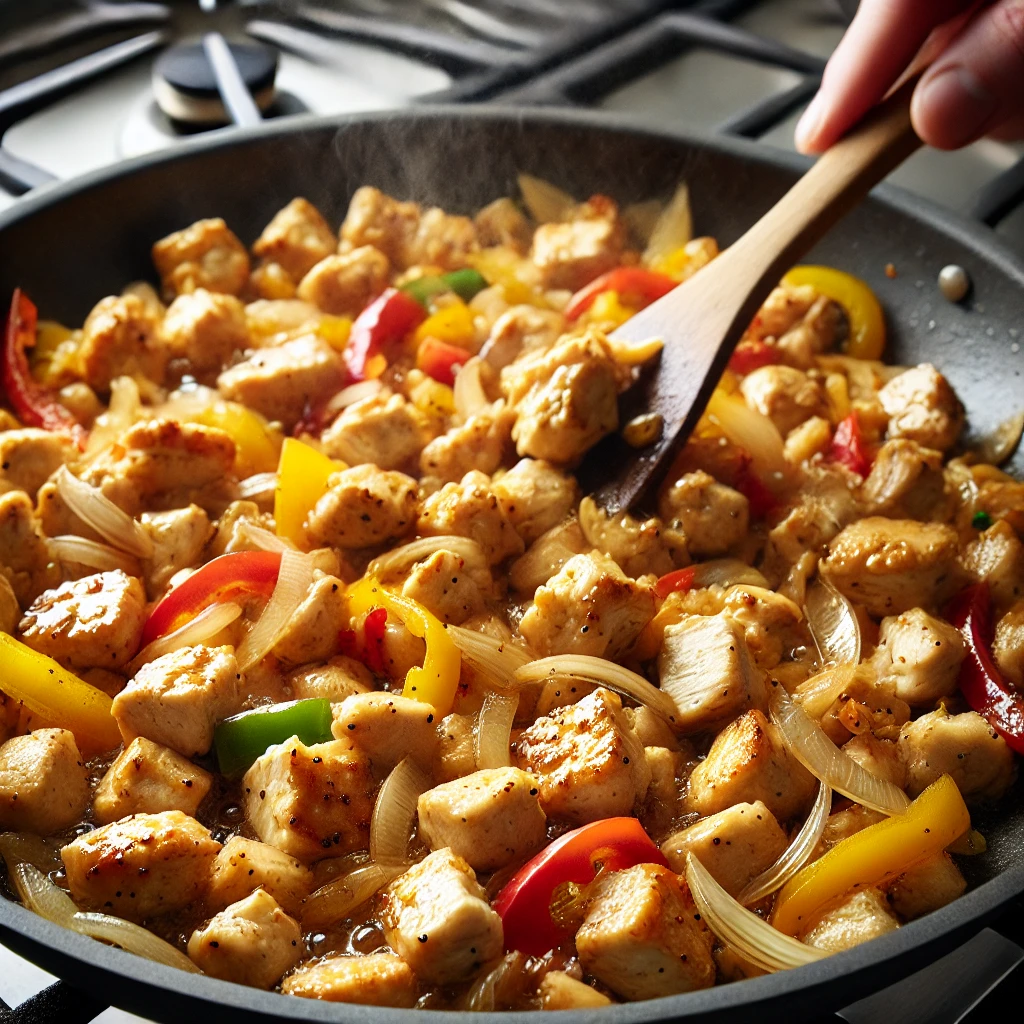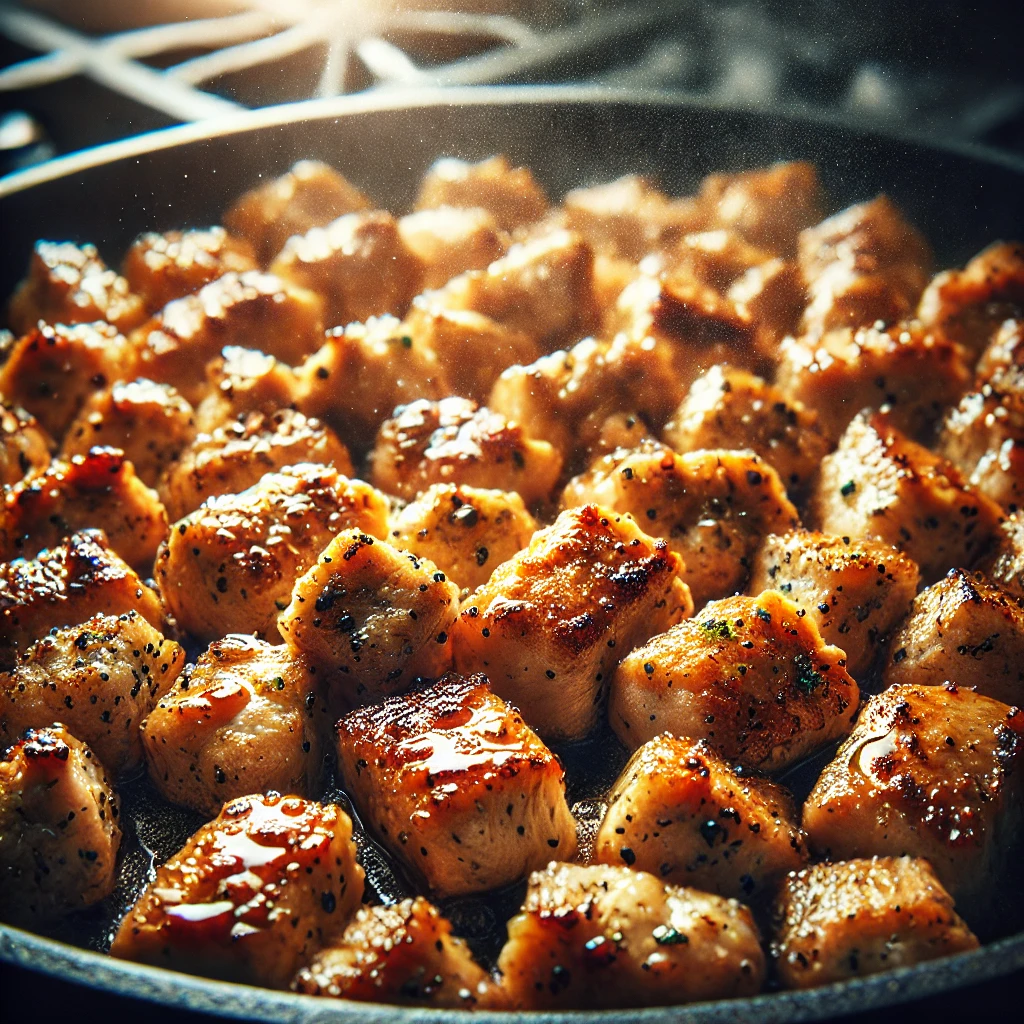Table of contents
Introduction
If you’re on a quest for mouth-watering, tender chicken dishes, you’ve come to the right place. Diced chicken recipes can often be tricky, leaving you with dry, unappetizing pieces. But fear not! With the right techniques and tips, you can transform your chicken into a succulent masterpiece that bursts with flavor in every bite.
Whether you’re a culinary novice or a seasoned chef, these secrets will help you achieve perfectly moist and delicious chicken every time. Let’s dive into the art of cooking diced chicken recipes that will have everyone coming back for seconds!
The Science Behind Moist Chicken
Understanding Moisture Retention
Moisture retention is crucial for juicy and tender diced chicken recipes. When cooking chicken, the proteins and fats play a key role in retaining moisture. Proteins, when cooked properly, help keep the juices inside, while the fats contribute to the flavor and succulence.
Different cooking methods can affect how well these components retain moisture. For example, stir-frying at high heat can quickly sear the chicken, locking in the juices, while baking with a cover can help create a steam environment, preventing the chicken from drying out.
Importance of Cooking Techniques
Using the right cooking techniques is essential for maintaining moisture in diced chicken recipes. Marinating the chicken before cooking can enhance its moisture content by allowing the flavors to penetrate deeply. Using lids or covers during cooking helps trap steam, which keeps the chicken juicy.
Cooking at the correct temperature is also vital. Too high a temperature can cause the chicken to dry out, while too low can result in undercooked meat. Ensuring a balanced approach to temperature and cooking time will help achieve the perfect moisture level in your chicken.
Benefits of Moisture Retention
Enhanced Flavor
Keeping the chicken moist while cooking enhances its flavor, making it more enjoyable to eat. Moisture helps the chicken absorb marinades and seasonings better, ensuring every bite is packed with taste. Juicy diced chicken recipes are far more flavorful because the moisture carries the seasoning throughout the meat, creating a delicious and satisfying dish.
Improved Texture
Moisture retention also improves the texture of the chicken, making it tender and pleasant to chew. When chicken dries out, it becomes tough and unappealing. By using the right techniques to maintain moisture, you can ensure your diced chicken recipes are always tender and juicy, providing a better eating experience.
Challenges of Cooking Diced Chicken
Common Problems
Cooking diced chicken can be tricky because small pieces of chicken can dry out quickly if not handled properly. One common problem is uneven cooking, especially if the chicken pieces are not cut uniformly. Another issue is that diced chicken tends to lose moisture faster than whole pieces, leading to dry and tough meat.
Solutions to Common Issues
To overcome these challenges, ensure that your chicken pieces are cut to the same size to promote even cooking. Use a meat thermometer to check the internal temperature and avoid overcooking. Marinating the chicken beforehand can also help retain moisture and add flavor. Additionally, using proper cooking techniques such as stir-frying at high heat for a short time or baking with a cover can help keep your diced chicken recipes juicy and tender.
Preparation Techniques
Choosing the Right Chicken
Selecting high-quality chicken is the first step in ensuring moist and delicious diced chicken recipes. Fresh chicken is generally more tender and flavorful than frozen chicken. However, if you use frozen chicken, make sure it is fully thawed before cooking. Opt for quality cuts like boneless, skinless chicken breasts or thighs, which are ideal for dicing and provide a good balance of flavor and moisture.
Properly Dicing the Chicken
Uniformity is key when dicing chicken. Cut the chicken into evenly sized pieces to ensure they cook at the same rate. Using a sharp knife makes the task easier and safer. Consistent sizes help prevent some pieces from being overcooked while others remain undercooked.
Marinating the Chicken
Marinating is a great way to add flavor and retain moisture in diced chicken recipes. A good marinade penetrates the chicken, making it tender and flavorful. Try a simple marinade with olive oil, lemon juice, garlic, and herbs for a quick and effective solution. Let the chicken marinate for at least 30 minutes, or overnight for more intense flavor.
Best Cooking Techniques for Moist Chicken

Quick Stir-Frying
Stir-frying is perfect for diced chicken recipes when you’re short on time. Heat your pan over high heat, then add a little oil. Once the oil is hot, add the diced chicken. Stir constantly for 5-7 minutes until the chicken is evenly cooked. This method quickly sears the chicken, locking in its juices.
Efficient Oven Baking
Baking is an excellent way to cook diced chicken recipes evenly. Preheat your oven to 375°F (190°C). Place the diced chicken on a baking sheet and cover it with foil to keep it moist. Bake for 15-20 minutes or until the internal temperature reaches 165°F (74°C). The foil helps trap steam, ensuring juicy chicken.
Flavorful Grilling
Grilling adds a unique flavor to your diced chicken recipes. Preheat your grill to medium-high heat. Place the chicken on the grill and cook for 6-8 minutes, turning occasionally. To keep it moist, you can brush the chicken with a marinade or oil during grilling.
Gentle Sautéing
Sautéing is a simple and effective method for cooking diced chicken recipes. Heat a pan over medium heat with a bit of oil. Add the chicken and cook for 6-8 minutes, stirring often. To maintain moisture, cover the pan for a few minutes to create steam, which helps keep the chicken juicy.
Cooking Tips and Tricks
Avoid Overcrowding the Pan
When cooking diced chicken recipes, it’s crucial to avoid overcrowding the pan. Overcrowding leads to uneven cooking and can cause the chicken to steam instead of sear, resulting in a loss of moisture. Make sure the chicken pieces have enough space to cook evenly and develop a nice sear, which helps lock in the juices.
Using Thermometers
Using a meat thermometer is a reliable way to ensure your diced chicken recipes are perfectly cooked. Insert the thermometer into the thickest piece of chicken, and make sure it reaches an internal temperature of 165°F (74°C). This helps you avoid overcooking, which can dry out the chicken, and ensures the meat is safe to eat.
Resting the Chicken
Letting your chicken rest after cooking is a key step in retaining moisture. When you remove the chicken from the heat, allow it to sit for about 5 minutes before serving. This resting period lets the juices redistribute throughout the meat, making it more tender and juicy. Cover the chicken loosely with foil during this time to keep it warm.
Additional Tips for Perfect Chicken
Using Broth or Stock
Adding broth or stock during cooking can help keep your diced chicken recipes moist and flavorful. When stir-frying or sautéing, deglaze the pan with a splash of chicken broth or stock. This not only keeps the chicken juicy but also enhances the overall flavor of the dish.
Covering the Chicken
Using a lid or foil to cover the chicken while it cooks traps steam, which helps retain moisture. Whether you’re baking, grilling, or sautéing, covering the chicken for part of the cooking time ensures it remains tender and juicy. This method is particularly effective for diced chicken recipes, as it prevents the small pieces from drying out.
Using the Right Cooking Oil
Choosing the right cooking oil is essential for moisture retention in diced chicken recipes. Oils with a high smoke point, such as canola or vegetable oil, are ideal for high-heat methods like stir-frying and grilling. Olive oil is great for sautéing and marinating due to its rich flavor, but it has a lower smoke point, so it’s best for medium heat cooking.
Preheating Cooking Surfaces
Preheating your cooking surfaces ensures that the chicken cooks quickly and evenly. Whether you’re using a pan, grill, or oven, make sure it’s hot before adding the chicken. This helps sear the chicken quickly, locking in moisture and preventing it from drying out.
Common Mistakes to Avoid
Overcooking
One of the most common mistakes when cooking diced chicken recipes is overcooking. Overcooked chicken becomes dry and tough, losing its appeal. Signs of overcooking include a firm, chewy texture and lack of juices. To prevent this, monitor your cooking time closely and use a meat thermometer to check the internal temperature. Remember, the goal is to reach 165°F (74°C).
Skipping the Marinade
Marinating is not just an optional step; it’s essential for moist and flavorful diced chicken recipes. Skipping the marinade can result in bland and dry chicken. Even a quick marinade can make a big difference. Take a few extra minutes to marinate the chicken with ingredients like olive oil, lemon juice, and herbs. This helps the chicken absorb moisture and flavors, making it more delicious.
Conclusion
Recap of Key Points
To achieve perfectly moist and flavorful diced chicken recipes, focus on selecting high-quality chicken, using proper dicing techniques, and choosing the right cooking methods. Marinating the chicken, avoiding overcrowding the pan, and using a meat thermometer are essential steps to prevent overcooking and ensure juiciness.
Encouragement to Experiment
Don’t be afraid to experiment with different cooking techniques and flavors. The more you practice, the better you’ll become at knowing how long to cook your diced chicken for optimal results. Try new marinades, adjust cooking times, and enjoy the process of perfecting your diced chicken recipes.
Final Thoughts on Cooking Diced Chicken
Cooking diced chicken to perfection is a valuable skill that can elevate your meals. By following the tips and techniques outlined in this guide, you can ensure your diced chicken recipes are always moist, tender, and full of flavor. Happy cooking!
Call to Action
Try It Out
Now that you have learned the best techniques for keeping diced chicken moist when cooking, it’s time to put them into practice. Experiment with different methods and find the ones that work best for you. Whether you’re stir-frying, baking, grilling, or sautéing, these tips will help you achieve juicy, flavorful diced chicken recipes every time.
Share Your Results
We’d love to see how your diced chicken recipes turn out! Share your results and photos on social media using the hashtag #MoistDicedChickenRecipes. Let’s inspire each other with delicious and juicy chicken dishes.
Give Feedback
Your feedback is valuable! Let us know how these tips worked for you and if you have any additional suggestions. Your insights can help others achieve perfect diced chicken every time.
Frequently Asked Questions (FAQs)
Q1: How long should I marinate diced chicken?
A1: Marinate diced chicken for at least 30 minutes to enhance flavor and moisture. For a more intense flavor, marinating overnight in the refrigerator is ideal.
Q2: What temperature should I cook diced chicken to?
A2: Cook diced chicken to an internal temperature of 165°F (74°C) to ensure it is fully cooked and safe to eat. Use a meat thermometer for accurate results.
Q3: Can I use frozen chicken for dicing?
A3: Yes, you can use frozen chicken, but make sure to fully thaw it in the refrigerator before dicing. This ensures even cooking and proper moisture retention.
Q4: What are some quick marinade ideas?
A4: Here are a few quick marinade ideas:
- Mediterranean Marinade: Olive oil, lemon juice, garlic, and herbs.
- Asian-Inspired Marinade: Soy sauce, honey, ginger, and garlic.
- Simple Citrus Marinade: Orange juice, lime juice, olive oil, and cilantro.
Q5: Is it necessary to let diced chicken rest after cooking?
A5: Yes, letting diced chicken rest for about 5 minutes after cooking allows the juices to redistribute throughout the meat, making it more tender and flavorful.

